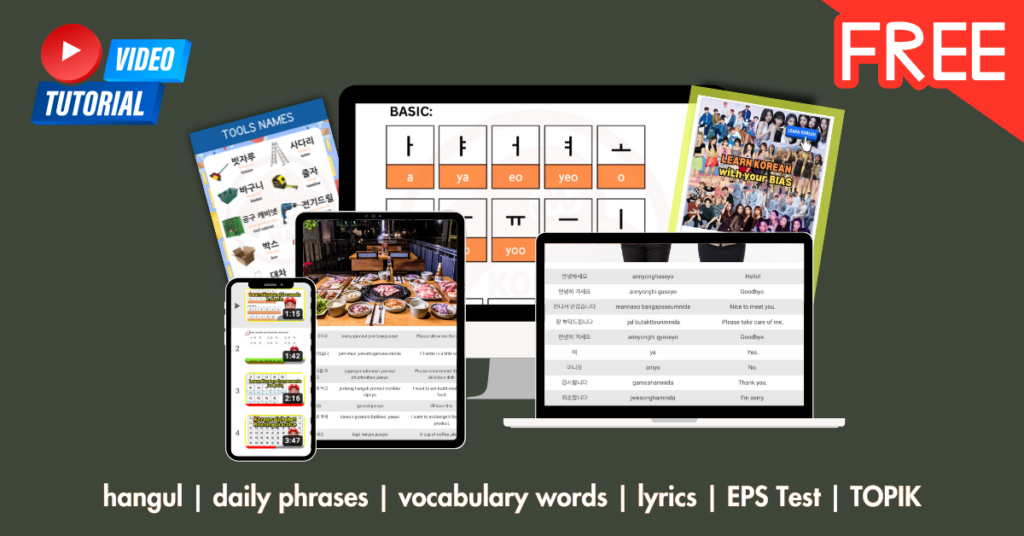아/어요 is the honorific form (informal polite style) used most in daily life. Compared to the formal polite style, this style is less formal and mainly used among family members, friends and other close acquaintances.

Learn more daily content on Instagram
Present Tense: A/V-아/어요
- 아요 is used when the word stem ends is ㅏ / ㅗ.
- 어요 is used when the word stem ends in a vowel other than ㅏ / ㅗ.
- 해요 is used when the predicate ends in 하다.
가다 → 가요 to go
자다 →자요 to sleep
알다 → 알아요 to know
앉다 → 앉아요 to sit
오다 → 와요 to come
보다 → 봐요 to see
만나다 → 만나요 to meet
먹다 → 먹어요 to eat
배우다 → 배워요 to learn
쓰다 → 써요 to write
키다 → 켜요 to switch on
마시다 → 마셔요 to drink
보내다 → 보내요 to send
꺼내다 → 꺼내요 to take out
공부하다 → 공부해요 to study
좋아하다 → 싫어해요 to like
싫어하다 → 싫어해요 to hate
운동하다 → 운동해요 to exercise
일하다 → 일해요 to work
전화하다 → 전화해요 to call
숙제하다 → 숙제해요 to do homework
Examples
- 가다 (ga da) – to go
- 학교에 가요. (Hakgyoe gayo.) – I go to school.
- 오다 (o da) – to come
- 친구가 와요. (Chinguga wayo.) – My friend comes.
- 보다 (bo da) – to see, to watch
- 영화를 봐요. (Yeonghwareul bwayo.) – I watch movie.
- 듣다 (deutda) – to hear, to listen
- 음악을 들어요. (Eumageul deuroyo.) – I listen to music.
- 마시다 (masida) – to drink
- 물을 마셔요 (Mureul masyeoyo.) – I drink water.
- 자다 (jada) – to sleep
- 밤에 자요. (Bame jayo.) – I sleep at night.
- 일어나다 (ireonada) – to wake up
- 일어나요. (Ireonaseyo.) – Please wake up.
- 앉다 (anjda) – to sit
- 의자에 앉아요. (Uijae anjayo.) – I sit on the chair.
- 읽다 (ikda) – to read
- 책을 읽어요. (Chaek-eul ilgeoyo.) – I read a book.
- 배우다 (baeuda) – to learn
- 한국어를 배워요. (Hangugeoreul baewoyo.) – I learn Korean.
- 가르치다 (gareuchida) – to teach
- 선생님이 가르쳐요. (Seonsaengnimi gareuchyeoyo.) – The teacher teaches.
- 알다 (alda) – to know
- 그 사실을 알아요. (Geu sasil-eul arayo.) – I know that fact.
- 모르다 (moreuda) – to not know
- 이것에 대해 몰라요. (Igeos-e daehae moreugesseoyo.) – I don’t know about this.
- 찾다 (chatda) – to find
- 열쇠를 찾아요. (Yeolsoereul chajayo.) – I look for the key.
- 기다리다 (gidarida) – to wait
- 기다려줘요. (Gidar-eojwoyo.) – Please wait.
- 놀다 (nolda) – to play, to have fun
- 친구들과 놀아요. (Chingudeulgwa norayo.) – I play with friends.
- 일하다 (ilhada) – to work
- 회사에서 일해요. (Hoesaeseo ilhaeyo.) – I work at the company.
- 도와주다 (dowajuda) – to help
- 친구를 도와줘요. (Chingureul dowajwoyo.) – I help my friend.
- 만나다 (mannada) – to meet
- 친구를 만나요. (Chingureul mannayo.) – I meet my friend.
- 사랑하다 (salanghada) – to love
- 가족을 사랑해요. (Gajogeul salanghaeyo.) – I love my family.
- 싫다 (shilta) – to dislike, to hate
- 이 음식이 싫어요. (I eumsigi silh-eoyo.) – I dislike this food.
- 좋아하다 (joahada) – to like
- 그 영화를 좋아해요. (Geu yeonghwaleul joahaeyo.) – I like that movie.
- 행복하다 (haengbokhada) – to be happy
- 저는 행복해요. (Jeoneun haengboghaeyo.) – I am happy.
- 화나다 (hwanada) – to be angry
- 왜 그렇게 화나요? (Wae geuleohge hwanayo?) – Why are you so angry?
- 슬프다 (seulpeuda) – to be sad
- 그 이야기가 슬퍼요. (Geu iyagiga seulpeoyo.) – That story is sad.
- 놀라다 (nollada) – to be surprised
- 그 소식에 놀랐어요. (Geu sosige nollasseoyo.) – I was surprised by that news.
Irregular Form
Korean Grammar Irregular Verb ‘ㄷ’ 불규칙
Verbs
걷다 (to walk)
묻다 (to ask)
듣다 (to listen)
깨닫다 (to realise)
Beginning with -아/어
걸어요
물어요
들어요
깨달아요
Beginning with -(으)
걸으면
물으면
들으면
깨달으면
- 저는 매일 걸어서 학교에 가요. [joneun maeil goroso hakkkyoe gayo]
I walk to school every day. - 친구가 저한테 뭘 먹고 싶냐고 물었어요. [chinguga johante mwol mokkkosimnyago murossoyo]
My friend asked me what I wanted to eat. - 저는 음악을 들으면서 집안일을 하고 있어요. [joneun eumageul deureumyonso jibannireul hago issoyo]
I’m doing housework while listening to music. - 그녀는 자신의 실수를 깨달았어요. [geunyoneun jasine silssureul kkaedarassoyo]
She realized her mistake.
However, not all of the ‘ㄷ’ ending verbs change their shape, some of them do not change.
Verbs
받다 (to receive)
닫다 (to close)
믿다 (to believe)
묻다 (to be stained)
Beginning with -아/어
받아요
닫아요
믿어요
묻어요
Beginning with -(으)
받으면
닫으면
믿으면
묻으면
- 생일 선물을 받아서 정말 행복했어요. [Saeng-il seonmul-eul badaseo jeongmal haengboghaesseoyo.]
I was really happy to receive the birthday present. - 마감 시간이 다 되어서 가게를 닫았어요. [Magam sigani da doeeoseo gagerul dadasseoyo.]
Since it was closing time, they closed the shop. - 저는 당신을 안 믿어요. [Joneun dangsineul an midoyo]
I don’t trust you. - 교수님께 질문을 물었지만 답변을 받지 못했다. [Gyosunimkke jilmun-eul muleotjiman dabbyeon-eul batji mothaetda.]
I asked the professor a question, but I didn’t receive an answer.
Korean Grammar Irregular Verb ‘ㅂ’ 불규칙
When a verb or an adjective stem which ends in ‘ㅂ’ is followed by an ending beginning with a vowel, ‘ㅂ’ changes to ‘워’.
Verbs
고맙다 (to receive)
춥다 (to close)
돕다 (to believe)
맵다(to be stained)
무겁다 (to be heavy)
가볍다 (to be light)
아름답다 (to be beautiful)
Beginning with -아/어
고마워요
추워요
도와요
매워요
무거워요
가벼워요
아름다워요
Beginning with -(으)
받으면
닫으면
믿으면
묻으면
무거우면
가벼우면
아름다우면
- 친구가 내게 선물을 줘서 정말 고마워요. [Chingu-ga naege seonmul-eul jueoseo jeongmal gomawoyo.]
I’m really thankful to my friend for giving me a present. - 겨울에는 항상 추워서 따뜻한 옷을 입어야 해요. [Gyeoul-eneun hangsang chuwoseo ttatteuthan oseul ib-eoya haeyo.]
It’s always cold in winter, so you need to wear warm clothes. - 친구가 곤경에 처해 있을 때 내가 도와줘야 해. [Chinguga gongyeong-e cheohae iss-eul ttae naega dohwajwoya hae.]
I need to help my friend when they’re in trouble. - 이 음식은 너무 맵다. [I eumsig-eun neomu maepda.]
This food is too spicy. - 책상이 너무 무거워요. [Chaeksang-i neomu mu-geo-wo-yo.]
The desk is too heavy. - 이 가방은 정말 가벼워요. [I gabang-eun jeongmal gabeowoyo.]
This bag is really light. - 그 꽃은 정말 아름다워요. [Geu kkoch-eun jeongmal areumdawoyo.]
That flower is really beautiful.
Korean Grammar Irregular Verb ‘ㄹ’ 불규칙
길다 to be long
놀다 to play
멀다 to be far
알다 to know
열다 to open
울다 to cry
팔다 to sell
만들다 to make
힘들다 to be difficult
달다 to be sweet
불다 to blow
걸다 to hang
밀다 to push
들다 to hold
풀다 to untie
늘다 to grow
Endings Starting With ㄴ,ㅂ,ㅅ
To conjugate ㄹ irregular verbs with endings starting with ㄴ,ㅂ,or ㅅ, ㄹ is dropped from the verb stem.
For example,
ㄹ Irregular Verb
살다
팔다
길다
울다
만들다
ㄴ,ㅂ,ㅅ Ending
-네요
-는데
-ㅂ니다
-세요
-니까
Conjugation
사네요
파는데
깁니다
우세요
만드니까
Learn Korean With More Blogs

- EPS Free Course
- Learn with BTS
- Numbers and Words
- Travel and Daily Korean
- TOPIK
- Hangul – The Korean Alphabets
- Beginner Grammar
- Intermediate Grammar
- Tools Names
Table of Contents

